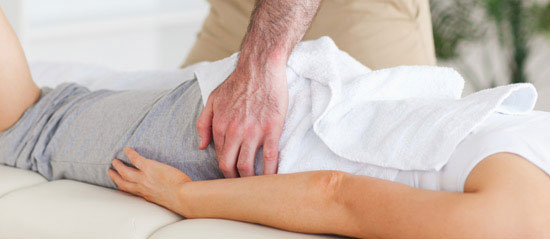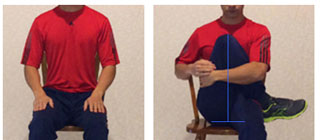
Do this Simple Exercise If You Have Glute Muscle and Back Pain
By Sherwin Nicholson | May 4, 2020
The Seated Leg to Chest Stretch is easy and effective
Did you ever notice that when your butt muscle (rear and side) hurts your back is also sore? Do you also find that this happens often when you sit?
This is because your already tight butt muscles are also tightening up your lower back. Don’t worry. You CAN fix this yourself.
When your gluteus maximus, medius and minimus are not both stretched and strengthened, you’ll hurt. When you sit all day long (and pretty much all of us do) these muscles become weaker and shorter.
The trick is to keep your butt moving!
Your gluteus maximus (butt) is the ‘primary mover’ for your hip let alone your entire body. If you’re not using it enough, you will hurt.
The problem too is that the less you use you g.max. the more strained and sore it itself becomes.
Weak and sore glutes fail to support the lumbar spine leading to pain. When they become tight, your pelvic tilt goes off and you easily risk injury to the discs in your spine. It is important for you to start reconditioning these muscles for relief.
The Seated Leg to Chest is a great exercise to help you.
When done correctly (that is carefully and slowly, not forced), you will release the tension from these tight muscles. It is #6 of the Progressive Exercises of the Program.
It helps in a number of ways to:
- Return you to neutral tilt (for even disc pressure, reduces posterior pelvic tilt).
- Stretch the g.maximus, medius and minimus (reduces pain from tightness, increased hip flexibility and mobility).
- Strengthen the lower and upper back muscles (maintain normal spinal curve).
- Strengthen the abdominals (reduces excessive anterior pelvic tilt).
There really is no reason NOT to do this movement (unless you are a Lay-Z stretcher) since sitting is required (ironically) to perform this exercise well. In fact, you should be doing this stretch during your breaks. (It is important to have consent from your family doctor prior to any routine such as the Seated Leg to Chest.)
Let’s Start the Seated Leg to Chest
Step 1: While seated, raise on knee up and bring the inner thigh up toward your chest. Use your hands to carefully assist in rotating the leg inward to your chest.

Hold and wait 1-2 minutes minimum to allow the muscle to fully release.
Step 2: Hold for 2 minutes while keeping your posture straight.
Step 3: Relax down and repeat with the other leg.
Step 4: Repeat often.
Tip: Contract your abdominals firmly against your raised thigh and hold.
Note: It will take time before you can fully bring your inner thigh to your chest. Don’t expect it to happen so easily. Make sure that your lower back does not bend during this hold or you’ll defeat the whole purpose of getting relief.
You should feel a very strong pull in the buttocks area as well as near the outside above the knee joint. The pull will change in sensation as the muscle learns to relax and stretch.
If you can (try) to do this while watching TV for the length of each commercial, you’ll really improve your flexibility.
Do not expect to be able to bring your leg to your chest fully. Raise as high as your current flexibility will allow. This exercise requires extensive periods of holding to allow the muscles to relax fully. This is one of the most helpful in the program.
Although this stretch is simple and easy, it takes time to work. You have stretched your glute but you haven’t strengthen it enough to fully recondition it. To get further help, continue with the 10 exercises for your pain. To really make a dramatic improvement, I encourage you to start the program today to feel the difference. It it worth the time and investment with a very high satisfaction rate and my email support. – Sherwin
“There are so many great things that I can say about this book.”
“I have been able to walk better and be able to bend over without much pain. This book is really recommended and I thank this author for what he has done to help people, such as myself, achieve great back health.”
GET MORE UNEDITED TESTIMONIALS AND REVIEWS
Order the program to help your glute and back pain
References:
- How to Build Core Stability for Lasting Relief – Gavine & Bonello. 2014. 617.56406Gav. Allen & Unwin Publish.
- Treat Your Own Back – 2011. Robin McKenzie. Gordon Soules Publishers. 9th Edition. www.gordonsoules.com
- Delavier Stretching Anatomy – RA781.63D4513, 2010. Frederic Delavier. Human Kinetics Publishing.
